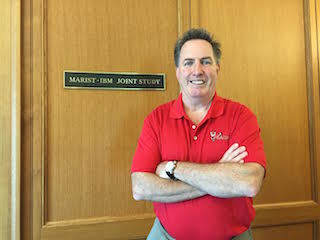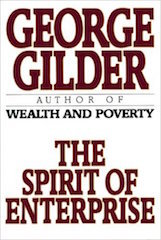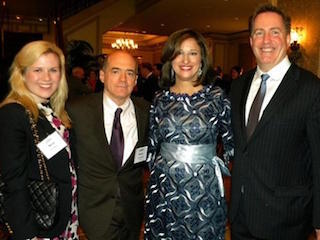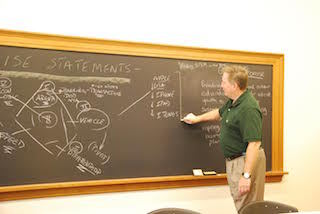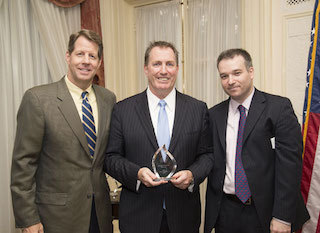An interview with High Impact Social Entrepreneurship (HISE)
expert Mike Caslin, PART ONE
Social entrepreneurship gets thrown around. A lot. Countless are published tips for social entrepreneurs, talks are given about the social good, and I too have had the privilege to write about the incredible social entrepreneurs I have met in my journey to boost entrepreneurship for youth around the world. But I think the power of social enterprise, and its potential impact on our economic future, still needs stating.
That's where Mike Caslin comes in. I first met him back in 1988 when NFTE was a fading dream--the organization I was fighting to found was having financial issues. He personified character and poise, joining me at NFTE and leading a turnaround from which NFTE has never looked back. From two employees and a budget of $200,000, to today, when NFTE stands 500,000 young entrepreneurs-strong.
Mike Caslin at Marist College
Mike's leadership skills, vast knowledge of business and philanthropy, and passion for growth and improvement have led him through years of advising turn-around ventures and investing in, serving on the board of or providing C-level leadership for for-profit and nonprofit ventures across sectors . Given that impressive track record, I asked Mike to share some insights and perspective as to the future of the changing face of the field and the U.S. and global economy and why social entrepreneurs are so vital to our future.
Steve Mariotti: For the past 36 years you have been immersed in the world of social entrepreneurship. How did you get there?
Mike Caslin: I always wanted to help people and from early on, my values and the power-filled concept of love thru entrepreneurial action mattered most to me.
Over time I came to understand that to live a purpose-driven life fueled by the power, creativity and possibility of entrepreneurship could help more people help themselves. I got started by reading George Gilder's epic, "The Spirit of Enterprise" and I founded my own company to help businesses adapt to the changing economy of the 80s.
Despite having worked at over a dozen jobs by the time I was 20, I never knew that I could be an entrepreneur. During the 70s, the social contract was quite simple and I never heard anyone talk about owning their own business as a means finding great joy and meaning in your work. After a period that included Liberal Arts school and a stint at the U.S. Merchant Marine Academy, I was able to see entrepreneurial possibilities at the same time that President Reagan's shared Spirit of Optimism was taking hold in a resurgent America.
The Spirit of Enterprise (source)
SM: What is the difference between an entrepreneur and a social entrepreneur? Are not all entrepreneurs solving a problem and hence all are social entrepreneurs?
MC: In fact, no--not all entrepreneurs are social entrepreneurs.
Why? Social entrepreneurs look to fill the "social-economic development-environmental stewardship" gaps in the marketplace not currently met by government, industry, or the academic/charitable sectors. Social Entrepreneurs understand the value of economic development and productive people (job creation), economic strength (profitability and sustainability) and environmental stewardship (waste, water, energy resource management).
Of the 30+ million businesses in the USA and the millions more globally, it is safe to say that just solving a problem or meeting a demand in the market does not make for social entrepreneurship. Take for example, the number of enterprises that pollute the air or the water around their factories, or create de facto sweatshops, for a great consumer product. The lack of values there creates a lasting negative impact and without massive changes makes a social entrepreneur's balanced scorecard impossible to achieve.
Nina Beary (Accolade Partners), me, Julie Kantor (NFTE), and Mike at a NFTE's Gala (source)
SM: What are some of the key trends entrepreneurs should be aware of?
MC: One key trend has been the redistribution of wealth from the private sector to government agencies and the industries that support them. In many ways, 1950 to 1990 were easy days for the American economy, beginning with the huge gains of rebuilding the post-WWII world. But the loss of the Gold Standard led to the 'bloat-ocracy' of the federal government, with its 60+ agencies and crushing regulations and taxes. I believe that wealth creation is the ultimate anti-poverty program and that one of the few things Alan Greenspan got right was his statement, "The only way to get ahead in America democratic capitalistic society is to save and invest, own a home and own a small business."
Another key trend is something I call the "four forces" of complete capital. This is a paradigm to look at how an entrepreneur behaves and can act with intention every day.
I. Intellectual Capital is the power of ideas, of innovation. You can bring your passions and concepts to life in the marketplace via cloud, social and information technology; and you can be self-reliant, not waiting for governmental permission.
II. Human Capital is the power of acting on those ideas.
III. Social Capital is the power of networks, the local economy and commerce, and importance of having a growing community of mutual support.
IV. Financial Capital means working towards a positive cash flow, the use of debt, equity and self-financed retained earning, in order to grow with and connect to your customers and market.
Mike teaching at the GCSEN Foundation
SM: What do you think is a big problem facing our world and how can social entrepreneurs be part of its solution?
MC: Right now, one of the biggest problems we are facing is the lack of strong, free and prosperous local economies and societies. For example, 90 million adults are not participating in the workforce, 40+ million are on food stamps, and since 2008, more business have begun to close than start.
I believe it is our duty to reverse this trend by encouraging and educating a new generation of social entrepreneurs who can take positive action based on rigorous training. I am working towards this goal with the Global Center for Social Entrepreneurship Network's (i.e. the GCSEN Foundation) innovative graduate and undergraduate programs and learning technologies; with Rising Tide Capital for adult learners; and with NFTE and Junior Achievement for high school and middle schools students.
My hope is for a society where the rule of law and private property is respected and work for everyone freely and fairly. Within that society, citizens can channel their passions into endeavors that create value for themselves by creating value for others.
Mike was the 2013 recipient of the Fund for American Studies Alumni Achievement award
(source)
SM: What do you think is at the root of this problem?
MC: These problems are rooted in the functional illiteracy of, and inability to harness the power of, social entrepreneurship. Today, many people feel overwhelmed by these very issues. We have to reverse this destructive attitude: we have the choice, in the words of Hugo, "to be wisps in the gloom or flames of the light."
How? Well, first we should share the facts about how profit and value is created. That is where social entrepreneurship and the GCSEN Foundation comes in.
Many young people and college graduates still don't know how to channel their abundant gifts and talents into the power of social entrepreneurship. If there is no stake in the future for nearly one third of our citizenry, then it is reasonable to expect the worst. Isn't it crazy that the daughter of the failed leader Hugo Chavez from Venezuela is worth $4B when families struggle for food and even toilet paper after almost the whole private sector has been nationalized under inept government plunder-crats?!
We need to help young people understand how they can participate both as individuals and as family members and local economy community builders. To paraphrase George Gilder, I believe that "Social Entrepreneurs are the heroes of our time and our economic life! From their knowledge of failure they forge success for so many more; from their acceptance of risk and difficulty, they create security and opportunity for so many more, in embracing local economy economic development, environmental stewardship and successful trade, they achieve economic stability for us all. " Social Entrepreneurs are true heroes. And across the world we need a lot more of them.
You can read more in Part Two of this article to be posted here.

